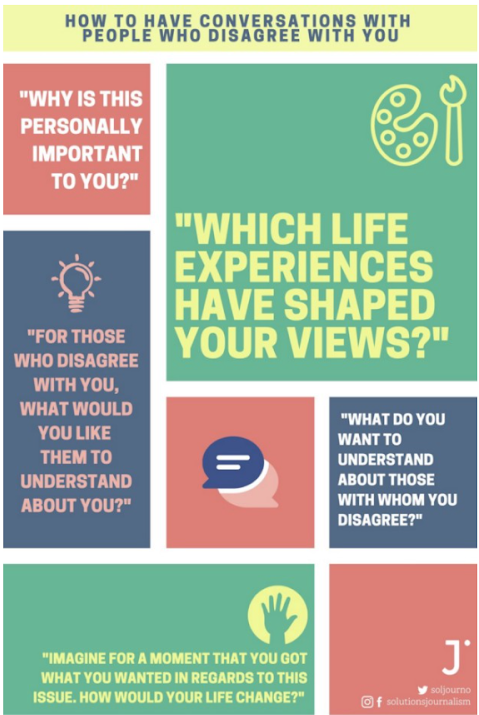What if journalists didn’t simply parrot knee-jerk opposing viewpoints, but instead covered controversial issues differently — based on how humans actually behave when they are polarized and suspicious? We at the Solutions Journalism Network first asked this question two years ago, when we commissioned research and published a powerful essay by journalist Amanda Ripley titled “Complicating the Narratives.”
Digging into this question, we found that journalists could learn a lot from those who navigate the complexities of conflict on a regular basis.
From there we developed training and interviewing techniques expanding on this research. Our goal was to help journalists better understand “how to get people to open up to new ideas, rather than closing down in judgment and indignation.”
[Read more: Data informs better solutions reporting]
The response from the journalists we’ve worked with has been enthusiastic, to the point where we realized it might be helpful to distill the main elements of this approach and share them more broadly, for anyone to use when navigating conflict.
As we barrel down the road towards more and more polarization it can feel emotionally exhausting and frustrating to engage with people who have opposing views, especially when those views perpetuate harm, prejudice and misinformation.
People can have a hard time listening when they don’t feel heard, so it’s important that we ask questions that uncover motivations because “the way to counter the kind of tribal prejudice we are seeing is to expose people to the other tribe or new information in ways they can accept. When conflict is cliché, complexity is breaking news.”

Here are five questions to help unpack people’s motivations in order to foster constructive discussion and active listening.
- Why is this personally important to you?
- I can tell this is important to you. Which life experiences have shaped your views? (OR) Out of curiosity, which life experiences have shaped your views?
- For those who disagree with you, what would you like them to understand about you?
- What do you want to understand about those with whom you disagree?
- Imagine for a moment that you got what you wanted in regards to this issue. How would your life change?”
[Read more: Journalists in Europe complicate the narrative of colonization]
And here are two stories demonstrating constructive discussion and active listening in practice.
A blues pianist tackles prejudice head-on by getting at the systemic root causes of hate. “Racists are so used to being combative, especially with someone they oppose, like me,” he says. “They’re not expecting me to listen to them. …They would expect me to fight — but I’m saying: Tell me more.”
Community collaboration in Ohio allows folks to step out of their comfort zones to examine topics like race and revisionist history and motherhood. “Using the principles of solutions journalism, these facilitated conversations bridge the gaps that exist between races, ages, and socio-economic groups. By complicating individual narratives, better communication happens and we end up closer together instead of further apart.”
This article was originally published by the Solutions Journalism Network on their blog. It was republished on IJNet with permission.
Main image CC-licensed by Unsplash via Sean Stratton.

